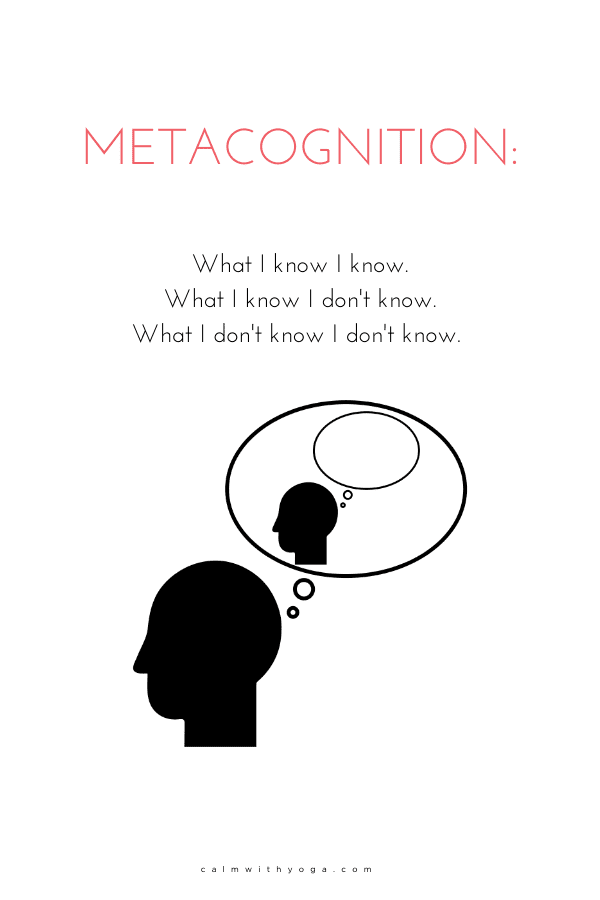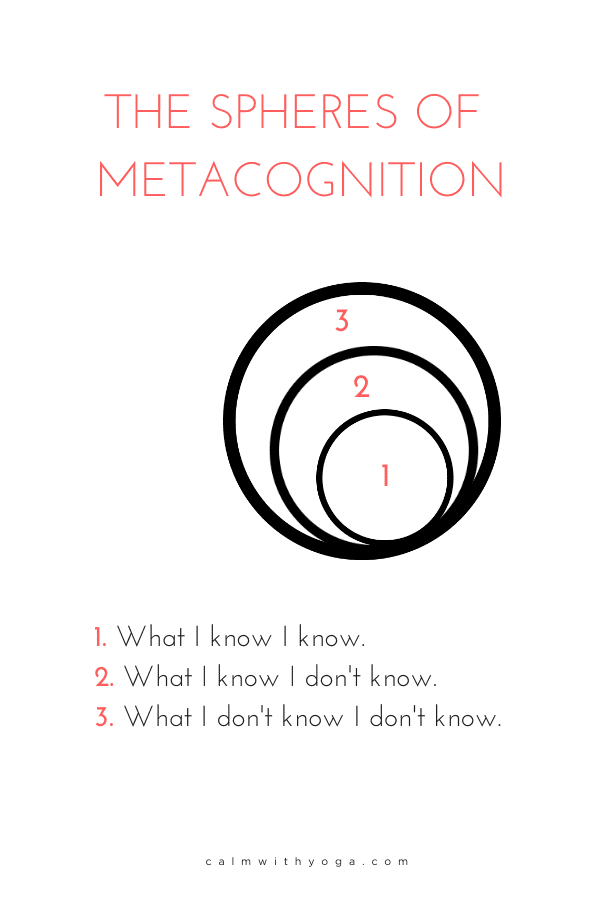– Michael Singer, author of ‘The Untethered Soul’ Have you ever wished that you could overcome or rise above a particular way of being? They say that the definition of insanity is: ‘Repeating the same thing over and over again expecting a different result.’ So how do you escape the hamster wheel? How do you stop repeating stuff you don’t want to keep repeating? The answer lies in self-awareness and self-reflection. You’ve got to become aware of your own thinking and get really good at self-assessment. This takes some work, diligence, and courage but if you can stick with it long enough you’ll uncover a whole other dimension of yourself and your thinking processes. And this is the first step to getting unstuck and overcome patterns that no longer serve you. That’s where metacognitive strategies and metacognitive skills come in very handy. Your metacognitive ability is directly linked to how efficient you are at problem-solving. (read: overcoming patterns)
Metacognition: Learning Experiences for Self-Growth
Metacognition (thinking about thinking) is a concept used in educational psychology, student learning, and child development. I don’t mean self-consciousness, where you’re limiting and evaluating yourself. I mean being aware of your own patterns. – Tony Robbins Its purpose is to help students become familiar with their experience, thought processes/ cognitive processes (their own thoughts), and their own learning styles so they can perform better and feel more confident. Developmental psychologist John Flavell defines metacognitive thinking as: According to Vanderbilt University: “Metacognition refers to the processes used to plan, monitor, and assess one’s understanding and performance. It includes a critical awareness of 1) one’s thinking and learning and 2) oneself as a thinker and learner.” In Yoga, Metacognition is referred to as Svadhyaya – the practice of self-awareness, self-study, and introspection. While metacognition was originally developed to be applied in scholastic circles (think young children or high school, learning strategies, and reading comprehension), you too can also use metacognitive processes to gain higher-level awareness and understanding of your own cognitive processes (thinking processes). In reality, we’re all students, even long after we finished formal education. Even if we didn’t partake in formal education. We’re students because we’re always learning something, whether we’re aware of it or not. Most of us are always looking to improve some aspects of our lives no matter how mundane. For a simple example, if you could learn a new, shorter way to get home from work, you would. Learning isn’t just limited to academia, traditional education, and the average classroom. True learning is never-ending; to learn is to absorb useful bits of information and spit them out in effective ways that produce results and help you perform better in life. The practice of metacognition, or learning about oneself, is linked to intelligence. Learning is, therefore, an aspect of intelligence. The more self-aware you are the more intelligent you become. You’re absorbing metacognitive knowledge when you’re:
learning more about yourself learning how to manage your moods and emotions learning how to balance your nervous system learning to cultivate resilience learning to increase coherence learning self-regulation and how to become more self-governed
The Spheres of Metacognition:
You can practice metacognition by using the Spheres of Metacognition: The first Sphere, “what I know I know” is the “easiest” to acknowledge. This question brings to the surface an inventory of relevant acquired knowledge already inside you. The next Sphere: “What do I know I don’t know” helps us get present with where our knowledge gaps lie. Sometimes it’s not easy to acknowledge that we “don’t know.” It may even trigger feelings of insecurity and inadequacy based on old programming. This question is a powerful one though because it helps us “get real” about where we are based on where we’d like to be. The moment you pinpoint what you know you don’t know, something interesting happens inside your brain… Your mind begins to seek out answers; it begins to pattern match. Your brain has a GPS-like system that scans through all incoming information to flag what’s meaningful. This system is called the Reticular Activating System. (RAS) I first learned of the RAS thanks to the teachings of Dr. John Demartini. He’s spent his life researching the dynamics of human behavior in an effort to understand why we do what we do, and how we can excel in every life area. He says: “The Reticular Activating System is the attention center in the brain. The RAS is the key to “turning on your brain,” and seems to be the center of inner inspiration and outer motivation… The Reticular Activating System is a very complex collection of neurons that serve as a point of convergence for signals from the external world and from the internal environment. It is the part of your brain where the world outside of you, and your thoughts and feelings from “inside” of you meet. Your RAS is the automatic mechanism inside your brain that brings relevant (meaningful) information to your attention. Your reticular activating system is like a filter between your conscious mind and your subconscious mind. It takes instructions from your conscious mind and passes them onto your subconscious.” The third and final Sphere is: what I don’t know I don’t know.” This question helps us uncover and identify our blind spots. Similar to the mechanism present in Sphere 2, once you ask the question: “what is it I don’t I know I don’t know” your brain (and higher self) will begin to seek out answers. If you keep your mind open, you’ll start to become aware of missing links. The blind spots will be shown some light. The trick with these Spheres is to begin bridging the gap between them. This is an ongoing process so be patient with yourself.
Think Metacognitively By Asking The Right Questions:
You can gain deeper metacognitive awareness (self-awareness and insight) by learning to rely on mental processes and specific strategies that help you get out of the story and into your own thinking. This (like any other skill and habit) is a learning process so stay consistent but be gentle with yourself. Make it a habit to ask yourself quality questions: – What do I want? – How do I feel about this? – How do I want to feel? – Will this make me feel expanded or contracted? – What do I need right now? – How can I give myself what I need? – How can I be my own best friend?

